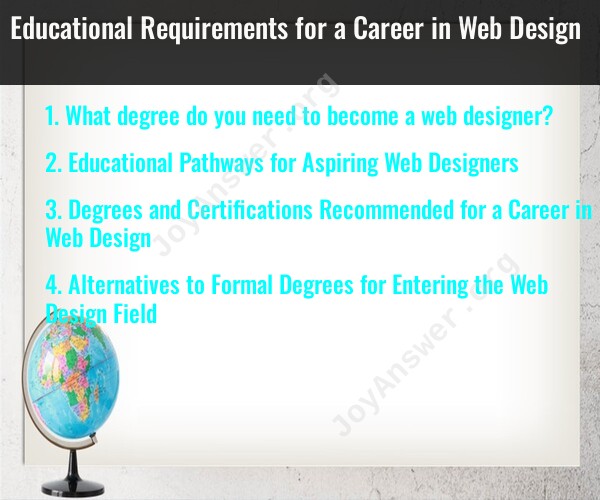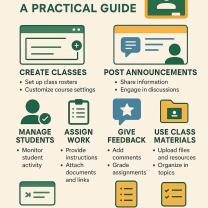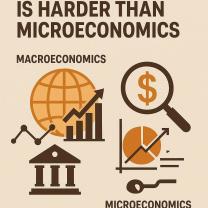What degree do you need to become a web designer?
A career in web design typically doesn't have strict educational requirements in terms of a specific degree. Instead, employers often value a combination of education, skills, and a strong portfolio that demonstrates a candidate's proficiency in web design. Here are some educational paths and considerations for a career in web design:
Education Options:
Bachelor's Degree: While not always mandatory, many web designers hold a bachelor's degree in a related field. Common degrees include Web Design, Graphic Design, Computer Science, Information Technology, or a related discipline. A bachelor's degree can provide a well-rounded education and a deeper understanding of design principles and technical aspects.
Associate Degree or Certificate Programs: Some web designers enter the field with an associate degree or a certificate from a community college or vocational school. These programs often focus on practical skills and can be a more streamlined path into the workforce.
Self-Taught or Bootcamps: Many successful web designers are self-taught or have attended coding bootcamps. Bootcamps are intensive, short-term programs that focus on practical skills and are designed to quickly prepare individuals for entry-level positions in web design.
Key Skills:
- Regardless of formal education, web designers should possess key skills, including proficiency in web design tools (e.g., Adobe Creative Suite, Sketch), understanding of design principles, HTML and CSS coding skills, knowledge of user experience (UX) design, and familiarity with web development frameworks.
Portfolio:
- Building a strong portfolio is crucial for web designers. Whether you have a formal degree or are self-taught, your portfolio showcases your design skills and provides potential employers with tangible examples of your work.
Continuous Learning:
- Web design is a field that evolves rapidly, with new tools and technologies emerging regularly. Successful web designers stay updated on industry trends, continually improve their skills, and may pursue additional certifications or courses as needed.
Networking:
- Networking within the web design community can be beneficial. Attending industry events, joining online forums, and connecting with professionals in the field can provide insights, mentorship, and potential job opportunities.
Certifications (Optional):
- While not always required, certifications can enhance your credibility and demonstrate specific skills. For example, certifications in web design tools, UX design, or specific programming languages can be valuable.
Remember that job requirements can vary based on the employer and the specific role. Some employers may prioritize skills and experience over formal education, while others may require a bachelor's degree. When pursuing a career in web design, focus on building a solid skill set, creating an impressive portfolio, and staying informed about industry trends.
Educational Pathways for Aspiring Web Designers:
Several educational pathways can equip you for a successful career in web design:
Formal Degree Programs:
- Bachelor of Arts (BA) or Bachelor of Science (BS) in Web Design or Visual Communication: Provides a comprehensive foundation in design principles, user experience (UX), coding, software applications, and professional skills.
- Bachelor of Fine Arts (BFA) in Graphic Design or Digital Media: Focuses on creative aspects like visual design, typography, and branding, alongside technical skills like web development tools.
- Associate of Applied Science (AAS) in Web Design or Web Development: Offers a shorter program geared towards practical skills and portfolio development, potentially faster entry into the job market.
Bootcamps and Intensive Programs:
- Coding bootcamps: Immersive programs focusing on programming languages like HTML, CSS, JavaScript, and frameworks like React, Angular, and Vue.js. Ideal for individuals with a strong design background seeking technical skills.
- UX/UI design bootcamps: Intensive programs focusing on user experience (UX) and user interface (UI) design principles, prototyping, and usability testing.
Self-Directed Learning:
- Online courses and tutorials: Numerous platforms offer online courses and tutorials on web design, coding, specific software applications, and design theory.
- Personal projects and freelance work: Build your portfolio through independent projects, freelancing, or contributing to open-source projects.
Choosing the right path depends on your individual goals, learning style, and budget. Consider:
- Desired level of expertise: Degree programs offer a broader skillset, while bootcamps focus on specific technical skills.
- Time and financial constraints: Bootcamps are shorter and intensive, while degrees require more time and financial investment.
- Learning style: Some thrive in structured programs, while others prefer self-directed learning.
Degrees and Certifications Recommended for a Career in Web Design:
While not always mandatory, certain degrees and certifications can strengthen your profile for web design jobs:
Degrees:
- Bachelor's degree in web design, graphic design, digital media, computer science, or related fields.
- Associate's degree in web design or web development.
Certifications:
- Professional certifications like Certified Web Designer (CWD) or Certified Web Professional (CWP).
- Software-specific certifications like Certified Adobe Associate in Dreamweaver or Adobe Certified Expert (ACE) in XD.
Remember: A strong portfolio showcasing your skills and creativity is often more crucial than formal degrees or certifications for landing web design jobs.
Alternatives to Formal Degrees for Entering the Web Design Field:
Several alternatives can help you break into web design without a formal degree:
- Bootcamps and intensive programs: As mentioned earlier, bootcamps offer a fast-paced way to acquire the necessary technical skills.
- Online courses and tutorials: Extensive online resources and self-paced learning platforms offer affordable options for acquiring knowledge and skills.
- Portfolio building and freelance work: Focus on building a strong portfolio by working on personal projects, contributing to open-source projects, or freelancing for clients.
- Networking and online communities: Connect with other web designers through online communities, attend workshops and conferences, and network with professionals to gain insights and potential opportunities.
Demonstrating your talent, passion, and ability to learn independently can compensate for the lack of a formal degree. Remember, continuous learning and staying updated with the latest trends and technologies are key to success in this dynamic field.
I hope this information helps you navigate your web design education journey! Feel free to ask any further questions you may have about specific programs, resources, or career guidance within the exciting world of web design.












